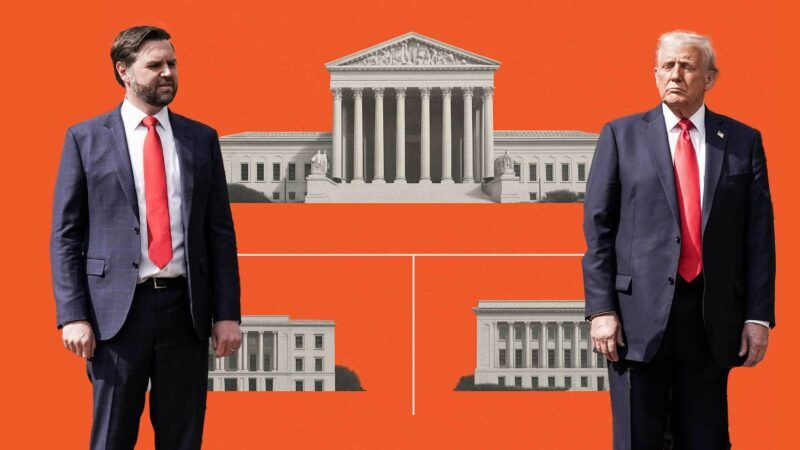What J.D. Vance Gets Wrong About Judicial Deference to Executive Power
The federal courts are supposed to be a bulwark against presidential overreach, not a rubber stamp.

Vice President J.D. Vance thinks the courts have no business questioning President Donald Trump's use of a wartime law to summarily deport alleged criminal aliens during peacetime. "I think that the courts need to be somewhat deferential," Vance told New York Times columnist Ross Douthat. "In fact, I think the design is that they should be extremely deferential to these questions of political judgment made by the people's elected president of the United States." There's just one problem with Vance's view: He's wrong about both the design of the American constitutional order and the judiciary's role in it.
Let's start with the role of the courts. The idea that the judicial branch owes special deference to the elected branches of government was thoroughly rejected by the framers and ratifiers of the Constitution. "As to the constitutionality of laws," Luther Martin told the Constitutional Convention in Philadelphia on July 21, 1787, "that point will come before the judges in their proper official character. In this character they will have a negative on the laws." Federal judges, Martin explained, "could declare an unconstitutional law void," thereby overruling the actions of the elected branches. None of the delegates disagreed with that.
"This Constitution defines the extent of the powers of the general government," Oliver Ellsworth told the Connecticut Ratification Convention on January 7, 1788. "If the general legislature should at any time overleap their limits, the judicial department is a constitutional check. If the United States go beyond their powers, if they make a law which the Constitution does not authorize, it is void; and the judicial power, the national judges, who, to secure their impartiality, are to be made independent, will declare it to be void."
James Madison, often called the "father of the Constitution," made the same point in his June 8, 1789, speech to Congress introducing the Bill of Rights. The proper role of the courts, Madison said, was to act as "an impenetrable bulwark against every assumption of power in the legislative or executive." Not exactly a ringing endorsement of judicial deference, is it?
Now let's examine the specific legal issue on which Vance thinks that Trump is entitled to "extremely deferential" treatment from the courts.
Vance's statement came in response to a question about Trump's invocation of the Alien Enemies Act, a 1798 law that allows the president to direct the "removal" of certain aliens "whenever there shall be a declared war between the United States and any foreign nation or government, or any invasion or predatory incursion shall be perpetrated, attempted, or threatened against the territory of the United States, by any foreign nation or government."
Trump invoked this wartime law in the hopes of deporting alleged members of Tren de Aragua, a street gang that first sprang up in Venezuela. But the Alien Enemies Act does not say what Trump claims that it says. There is no "declared war" between the United States and Venezuela, and there is no "invasion or predatory incursion" of the U.S. by "any foreign nation or government." Tren de Aragua is not a foreign state, and the gang's alleged crimes do not qualify as acts of war by a foreign state. Trump's position disfigures the text of the Alien Enemies Act to the point that it is no longer recognizable.
That is the "political judgment" that Vance finds so deserving of the judicial rubber stamp. "I think you are seeing an effort by the courts to quite literally overturn the will of the American people," Vance told Douthat. "You cannot have a country where the American people keep on electing immigration enforcement and the courts tell the American people they're not allowed to have what they voted for."
But of course, the courts can and should "tell the American people they're not allowed to have what they voted for" if what they "voted for" happens to be unlawful or unconstitutional. Indeed, that is the whole point of our constitutional system. We do not live in a pure democracy in which the president gets a blank check after every election. We live in a representative republic that is chock full of meaningful checks and balances, including the very important check against presidential overreach that we call judicial review.


Show Comments (51)